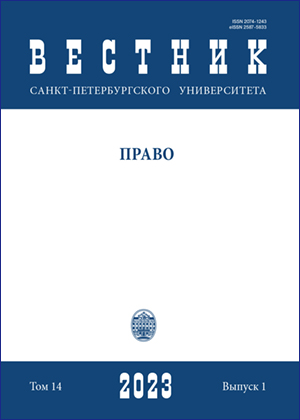Criminological analysis of the identity of a fraudster in the field of misuse of electronic means of payment
DOI:
https://doi.org/10.21638/spbu14.2023.107Abstract
The processes of digitalization and technologization developed the social relations, but also acted as a catalyst for the development of illegal activities. A typical example of a crime of this group is fraud using electronic means of payment. Based on the low detection rate of this crime, about 30 %, according to the Ministry of Internal Affairs of Russia, as well as the high degree of latency of illegal banking transactions, the optimization of preventive activities is of particular relevance, which requires research the personality of the offender. Within the framework of this article, the socio-demographic, socio-role and socio-psychological substructures of the offender’s personality are analyzed. The official statistics for the period 2013–2020 were studied, as well as the judicial practice in the amount of 115 verdicts in criminal cases for the same period. The typical gender of the offender, his age, education and territory of residence, his professional affiliation were established. The analysis of the socio-psychological substructure of the personality made it possible to produce a conclusion about the depth and stability of the criminalization of the offender, as well as his criminal motivation. As a result of a comprehensive study, a criminological portrait of the personality of a fraudster in the field of misuse of electronic means of payment was compiled, contradictions were revealed between the portraits of the personality of a general criminal fraudster and a cybercriminal formed in the doctrine of criminology with the data obtained. The results of the study can be used in the framework of improving the prevention of crimes committed using information technology in general, and the misuse of electronic means of payment, in particular.
Keywords:
fraud, electronic means of payment, identity of the criminal, pin-less debit fraud, information technology, criminological research, personality characteristics, criminological characteristics of a fraudster
Downloads
References
Downloads
Published
How to Cite
Issue
Section
License
Articles of "Vestnik of Saint Petersburg University. Law" are open access distributed under the terms of the License Agreement with Saint Petersburg State University, which permits to the authors unrestricted distribution and self-archiving free of charge.






